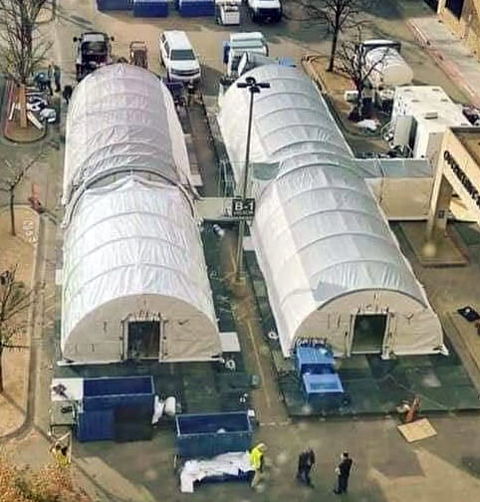One of the many healthcare workers working days on end with COVID patients at that hospital, posted the picture sent to her by a co-worker, who took a photo of the grim scene out of the hospital window, as tents were set up to handle the overflow of patients in the Lubbock area needing help.
We interviewed Lubbock-area Occupational Therapist Amanda Jackson Maggard at UMC and critical care surgeon Dr. Sharmila Dissanaike at Texas Tech University Health Sciences Center, who have both seen the devastation of COVID first hand and are worried about the developing situation in that part of Texas.
“Medical tents arrived this week,” said Maggard. “That’s something I certainly never thought I’d see in my career.”
A Critical Care Surgeon at one of Lubbock’s main hospitals, UMC, Dr. Dissainaike also pleaded with the public to take this more seriously.
“The tents are being used to house lower-acuity (less sick) patients, so we can make room for more sick patients within the hospital,” Dr. Dissanaike said. “Both major referral hospitals in Lubbock – UMC (where my primary practice is) and Covenant have tents set up in the parking lots. Obviously, nobody thinks a tent is an ideal solution – but it is better than nothing at this point. I expect the existing tents to be completely full within a few days by the way, and we will back to square one unless we stop the flood of new patients.”
“The decision to continue with life as usual, even if it means overwhelming hospital resources, is one that only We, The People can make,” Dr. Sharmila Dissanaike said. “It therefore falls on our local community to speak up and request city, county and state officials stop large gatherings, enforce mask wearing and limit occupancy in all public spaces, in order to keep businesses open while trying to restore the ability to care for our citizens when they are sick and need our help the most.”
“Right now, people are suffering, even dying because of lack of basic medical and surgical care,” Dissanaike adds. “We cannot care for patients who are injured, or have common problems like heart attacks and appendicitis in our region, when we are full. If this cannot be reversed soon, many people in our region will die because of Covid, even if they never actually had Covid….. I think it is important people realize this isn’t just about Covid; when hospitals are overflowing, people with all sorts of common diagnoses will suffer.”
Dissanaike also serves as the Chair of Surgery in the Lubbock hospital, which is the hub of the area.
“We are literally at the point that people in our region cannot get the basic medical care they need,” Dr. Dissanaike said. “I think it is important that the public understands what we are facing right now. I feel as if there is a tsunami coming in and there are still people out there fishing.”
“Healthcare workers are at the end of our tether,” Dr. Dissanaike adds. “The hospitals being full are preventing us from being able to provide basic surgical care in many instances. If you have a blood clot in your leg–you need to get that out in 6 hours. Otherwise, you may lose your leg or your life. So then what happens if it takes longer than 6 hours to find a hospital bed? If we don’t have beds open at the big hospitals, how can we accept transfers from the small rural hospitals? Another example, if you have appendicitis, sure I can fix that in about 30 minutes, if you can get to me, but we are getting to the point that we are running out of room in the large hospitals that have the surgeons and resources needed to treat these emergencies, and people just don’t understand that rural hospitals often do not have the resources to do a critical surgery like this.”

Maggard adds, “It’s shocking how many people still don’t wear masks in public, who are having large group gatherings, who are making this political when it’s anything but. Despite a public letter from our Lubbock County Medical Society (which includes many prominent and well respected local physicians) pleading with our mayor to enforce mask wearing in public and limit the size of gatherings he refuses. We have doctors that have worked 200 days straight and nurses caring for COVID patients day in day out dealing with the unpredictability that is COVID and death after death. I honestly don’t know how they’re doing it.
“We are tired. We are frustrated. We are burnt out.”
“In the words of my friend and colleague: ‘So please consider why you’re choosing not to wear a mask. To save your life or others, this is such a small thing to ask. A mask does not mean weakness or that you are afraid. A mask is not political and does not mean that you’ve lost faith. To wear a mask is dignified, kind, and science-based. It means you love thy neighbor.’”
She explained some of the things she’s seen in treating COVID patients as an occupational therapist.
“We evaluate and treat patients in the hospital with focus on regaining their prior level of function. For the first few months of the pandemic I was working in three ICU’s – one of which became our first COVID ICU. Most of the patients I worked with at that time had been intubated (sometimes for weeks) and had profound weakness. Many could not even raise their arms enough to do basic self care such as washing their face. In addition to weakness many had neurological issues such as neuropathic pain paresthesias. I’ve since rotated to another zone which was a general med/surg floor and is now being converted to another COVID unit,” Maggard said.
The therapist recalls one patient in her 30s about a month ago.
“She had previously been admitted with respiratory failure due to COVID pneumonia and had been in the hospital over a month. She discharged and I saw her when she was readmitted for some GI issues. This woman was independent and worked out in the fields prior to becoming sick. When I saw her about 2 months post COVID she still required supplemental oxygen, needed maximum assistance to do stand pivot transfers to a wheelchair, was still unable to walk. She required built up handles on her utensils in order to feed herself. She needed assistance to dress and bathe. She had severe pain in both feet described as stabbing or like she was walking on glass. She discharged home with 24 hr family care and was to receive home health,” Maggard adds.
The tents were set up as COVID-related deaths increased and hospitalizations in Lubbock surged. At the same time, hundreds of hospital workers fell ill or were quarantined due to having COVID or being exposed to the coronavirus.
At UMC alone, 227 staff members were quarantined as of November 11, one news station reported.
The City of Lubbock reported a record number of new cases (750) this past Sunday, November 15th.
As of 4:00 p.m. that day, a local news station in Lubbock reported “there are a combined 13 open hospital beds and 15 patients holding for beds at University Medical Center and Covenant Health System. Note that this reflects staffed beds open to receive patients and differs from the available bed count shown on the DSHS and the City of Lubbock dashboards. These dashboards count all available beds, including specialty beds, such as pediatrics, PICU, outpatient, psychiatric and others, as well as hospitalized patients in the 22 county Trauma Service Area.”
On November 15, there were 320 hospitalized and the death toll had reached 273 according to the Lubbock Health Dept.
By Kayleen Holder
Editor
